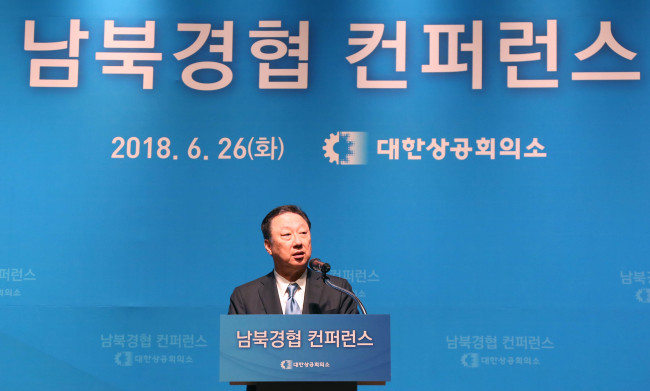During a forum on Tuesday, experts on North Korea shared views that overheated expectations of inter-Korean economic cooperation should be moderated, as companies may have to wait a long time before seeing the benefits of economic ties.
Following the historic US-North Korea summit earlier this month and the inter-Korea summit in April, media outlets and analysts have expressed an optimistic economic outlook for the two Koreas, while industries and governments busily set up task forces to embrace the North, which is underdeveloped but rich in resources.
 |
Park Yong-maan, KCCI chairman, speaks at the inter-Korean cooperation forum held Tuesday. (Korea Chamber of Commerce &Industry) |
“As expectations of inter-Korean cooperation are on the rise recently, some tend to approach it somewhat rashly. But the competitive approach needs to be fully weighed with enough time and information,” said Park Yong-maan, chairman of the Korea Chamber of Commerce & Industry, in an opening speech at the inter-Korean economic cooperation conference held Tuesday.
This is the second such forum hosted by the KCCI, which had acted as a bridge between businesses of the two Koreas during the Roh Moo-hyun and Kim Dae-jung administrations.
Park said calm and orderly conditions need to be created for inter-Korean economic cooperation until sanctions on North Korea are lifted.
“A private and public consultative body between the two Koreas needs to be formed first to contemplate different economic bases such as standards, protocols and business systems,” he said.
Other speakers also mentioned the risk of hasty moves for economic cooperation between the two Koreas, saying companies need to understand it would take a significant amount of time for the North to prepare the basis for inter-Korean cooperation.
“Some companies think they can advance into the North Korean market immediately. But the North should first settle administrative processes and related systems, such as taxation, administrative approvals and possession of real property,” said Kim Seok-jin, a researcher at the Korea Institute for National Unification.
“Also, because the North is not a market economy and its businesses are controlled by the authorities, individual companies will find it difficult to negotiate with the authorities. Negotiations should be completed at the national level first,” Kim said.
The researcher also said South Korea should wait until UN sanctions on North Korea are lifted. “Otherwise, we will break the international agreement.”
Since the early 2000s, the UN has imposed financial sanctions on North Korea to ban capital and financial transactions with UN member nations. It has also banned the North from exporting its resources, such as coal, minerals, seafood and fiber, to the member nations.
“When sanctions are lifted and the North opens its market, other nations, including China, Japan, the US and the European Union, will rush to the North Korean market,” said Yang Moon-soo, a professor from the University of North Korean Studies.
This will significantly increase the North’s bargaining power and the South may be excluded, according to Yang.
“Before that happens, the South needs to be prepared. We need to map out a long-term partnership plan with the North instead of a short-term business model,” he said.
By Shin Ji-hye (
shinjh@heraldcorp.com)








